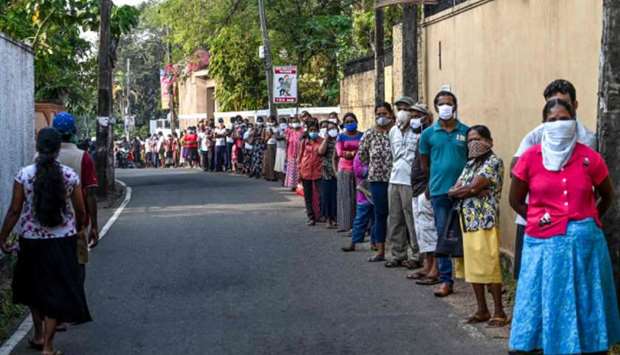As Sri Lanka resorts to desperate measures to prevent the spread of the coronavirus, many people are struggling to cope up with long hours of curfew after police banned even casual gatherings among neighbours.
TV stations are showing popular films, and Internet service providers are offering low-cost packages to let people browse the Internet and check their social media in order to stay
occupied during the curfew.
But even so, according to Deputy Inspector General of Police Ajith Rohana, as many as 2,000 people have been arrested for violating the curfew, and 500 vehicles were seized while being used at those times.
“We have instructed the police not to allow people to have gatherings, even meeting up with neighbours. Persons will be arrested for violating the
instructions,” Rohana said.
A 60-hour curfew was lifted on Monday morning in 17 of the country’s 25 districts in order to allow people to buy food, but it has since been reimposed, and in some districts extended up to 140 hours.
The people worst affected by the curfews have been daily wage earners, mainly in the country’s capital, where people depend on work at the port, airport, markets and by operating taxi services.
Many in Colombo believe that the curfew was too long, as it was affecting their sources of income. “I am a taxi driver and depend on the income from the daily hires I gain. I have been one of those severely affected by the curfew,” said Jameel Abdeen of Colombo.
In the capital district, the curfew imposed on Friday evening was further extended for 24 hours and was re-imposed yesterday.
“The curfew is also having an adverse effect in some houses, as the number of cases of domestic violence is on the increase,” said Pushpa Ramyani Desoysa, a chief nurse at the National Hospital in Colombo.
The number of people admitted over injuries due to domestic violence, where men have beaten up their wives, are on the rise, she said.
Yet while there were mixed reactions about the stringent measures, which include not only the long curfew hours but also restrictions on travel between districts, the majority of people believe that strict controls are necessary to control the spread of the coronavirus.
“The long hours of curfew may cause inconvenience, but have been helpful to slow the spread of the virus and thereby avoid situations experienced in some of the foreign countries,” said Priyankara Jayasinghe, a resident in the northwestern part of the country.
He said that in his district, where thousands of family members work or live in Italy, most welcomed the curfew and cooperated with police to enforce it.
Strict quarantine procedures are also among the string of measures taken to control the spread of the virus.
The army is maintaining the majority of 45 quarantine centres, where 3,458 people have been placed in isolation for 14 days.
Most of them have returned from overseas, including those who were working in South Korea and Italy.
Considering that Sri Lanka has seen a comparatively low 96 confirmed cases so far and zero deaths, are such strict measures necessary?
Health authorities say that they are not taking chances.
“The situation may change soon,” warns Dr Anil Jasinghe, director general, health services.

People wearing facemasks queue outside a shop at Piliyandala on the outskirts of Colombo yesterday, as the authorities briefly lifted a curfew.
